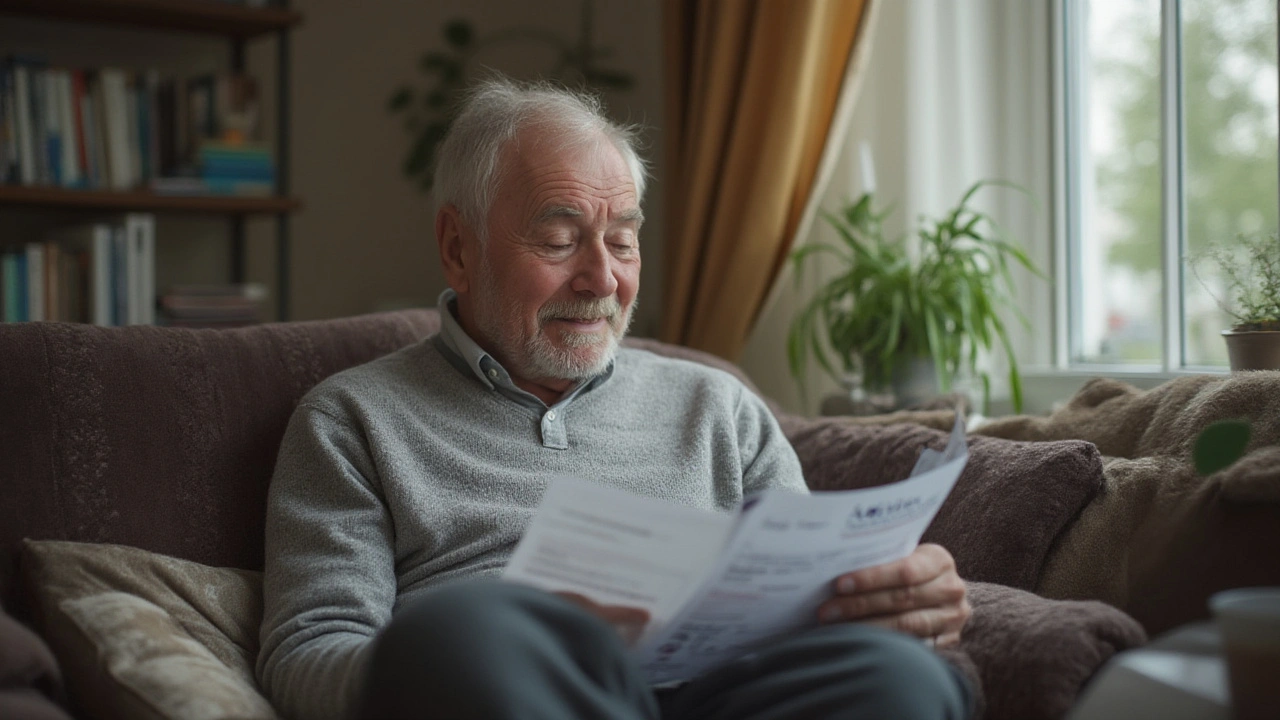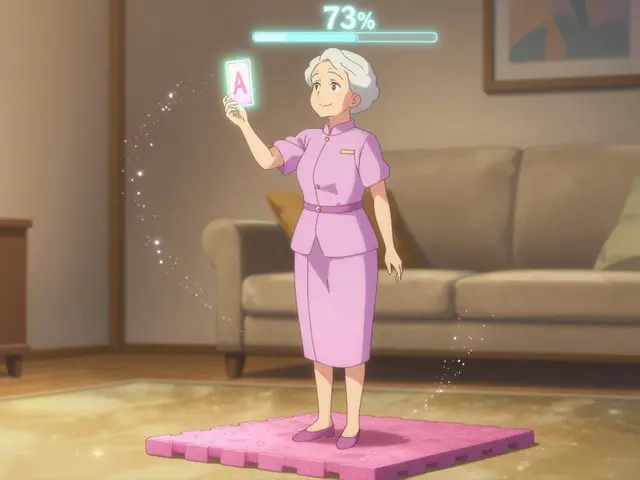Imagine sitting with your morning coffee, your heart skipping with anxiety, and the doctor mentions Ativan. A sense of both relief and worry passes through you—can a medicine for nerves disrupt your heart, especially if you’re managing arrhythmia, hypertension, or past heart trouble? This is not a small question. Here’s the real kicker: Ativan, or lorazepam, sits at an awkward crossroad for heart patients. It soothes, yes, but under the wrong circumstances, it can tip things out of rhythm—literally. Let’s get right to what matters most for heart health when Ativan is in the picture.
Understanding Ativan: Risks and Benefits for Cardiac Patients
When your doctor brings up Ativan, it’s probably to help with anxiety, panic, or even problems sleeping. It works fast, calming nerves by boosting a calming chemical in your brain called GABA. But here’s the deal: anxiety and stress don’t just stay in your head—they pump up your blood pressure and mess with your heart rhythms. That’s why so many heart patients end up discussing meds usually handed out for mental health.
But is Ativan actually safe for someone with heart disease? The story is complicated. Lorazepam is not officially banned for those with arrhythmias, hypertension, or coronary artery disease, but it isn’t a free pass either. Studies dating back to the 2000s showed Ativan itself does not directly trigger arrhythmias like older drugs (say, tricyclic antidepressants) can, but it’s not free of cardiac side effects. High doses or sudden increases can slow your heart rate, drop your blood pressure, or—if you’re very sensitive—nudge your rhythm out of whack. For someone whose heart is already fragile, that’s a risk you must not ignore.
For those with coronary artery disease, the core benefit is stress reduction. Lower anxiety equals fewer stress hormones, reducing the strain on your heart. People with hypertension see a subtle but real drop in blood pressure with careful Ativan use—again, because anxiety spikes disappear. Still, the dose makes the difference. Take too much, and you risk dropping your blood pressure so fast that you get dizzy standing up. That’s not just annoying—it can lead to falls or even a mini-stroke.
If you’ve got a history of arrhythmias, there’s another layer. Ativan can make your heart rate slower, or occasionally change the QT interval on your EKG—a rare but serious problem if you’re already on certain other medications. There aren’t endless studies about Ativan specifically in arrhythmia, but cardiologists keep a close eye because of these possible—if uncommon—issues.
The point is not to scare you off. Ativan is still prescribed by heart doctors, especially when anxiety is making symptoms worse. The trick is paying attention to dosing and never adjusting it yourself.
Safe Dosing Practices: Real-World Guidelines for Heart Patients
So, how do you make Ativan work for you if you have heart problems? There’s no one-size-fits-all dose. People metabolize Ativan differently based on kidney function, age, and even sex. But most experts would never start a heart patient on the regular full dose that’s handed out to young, otherwise healthy people. Typical starting doses for anxiety are 1-2 mg per day, divided in 2-3 smaller doses. For someone with a heart condition, 0.25-0.5 mg taken once or twice a day is far more common as a starting point, and even that can be adjusted down if there are side effects.
Main tips?
- Never start or stop Ativan suddenly. Withdrawal can cause rebound anxiety, fast heart rate, or worse arrhythmias. If you want to quit or reduce your dose, always taper—usually by 0.25 mg every few weeks, or even slower if you’ve been on it awhile.
- Keep a blood pressure log for the first 2 weeks on the new dose. If you see numbers drop too low (say, under 100/60 mmHg), or you feel lightheaded, talk to your provider right away.
- If you have arrhythmias, ask for a baseline and follow-up EKG. Your cardiologist may want to see what Ativan does to your QT interval or heart rate, just in case you’re among the rare few who react badly.
- Be brutally honest about drug and alcohol use. Mixing Ativan with opioids, other sedatives, or even alcohol can slow your breathing and heart rate much more than you’d expect. It gets risky faster than most people realize.
- Avoid taking Ativan right before bedtime if you have sleep apnea or any condition that slows your nighttime breathing. Hypoxia—low oxygen at night—is extra dangerous if your heart is sensitive.
- Use Ativan only as long as needed, and keep the pharmacy in the loop. They can check for bad interactions with blood pressure pills, statins, or certain anti-arrhythmic drugs.
One thing I now do with every patient: warn them that Ativan, like most benzodiazepines, can cause tolerance. Your body gets used to it, meaning you might need a bit more for the same effect after a month or so. But higher doses mean greater risk for heart rhythm changes or drops in blood pressure. It’s a balance, not a race to zero anxiety. Daily conversations between you, your heart doctor, and whoever prescribed Ativan are essential.
There’s also a “weekend warrior” error—taking extra pills during stressful events. Patients sometimes double or triple their dose when family comes to visit or work stress explodes. That’s tempting but can spell disaster for someone with heart issues. Spread out doses, don’t double up. If anxiety feels out of control, call your doctor instead of reaching for more pills.

Ativan and Heart Interactions: What Science Says and What to Watch
Let’s get into specifics that matter for your daily routine. Heart medications and Ativan usually play nice, but there are some caveats. Beta-blockers, ACE inhibitors, and statins don’t have direct negative interactions with Ativan, but sometimes the combination makes blood pressure too low. Diuretics and other drugs that dehydrate you can also make you sensitive to Ativan’s sedative effect. Keep water intake steady, especially in hot weather, to avoid weakness or dizziness.
Many readers ask about sudden palpitations after starting Ativan. Palpitations aren’t usually caused by Ativan unless you’re also suddenly stopping caffeine or another stimulant. More often, Ativan’s calming effect actually reduces skipped beats, but at higher doses, you might sense more slowdowns than usual. If you already wear a Holter monitor, jot down when you take your dose so your cardiologist can trace patterns.
Don’t ignore your diet either. Grapefruit juice can slow down the way your liver clears Ativan, leading to higher levels in your bloodstream. Avoid it, and stick with water or coffee (in moderation—the whole point is to keep things calm, after all). For those on blood thinners, Ativan doesn’t directly interact, but keep watch if you’re feeling especially tired or weak, just to make sure there isn’t a hidden problem.
Some rare but real problems can develop. Older adults with heart disease are more likely to develop confusion, falls, or even pneumonia on long-term Ativan. If you’ve noticed memory slipping, or your family points out changes, take their words seriously and ask your doctor about a medicine review. The line between “just enough” and “too much” is slim for heart patients.
Watch for these red flags:
- Severe, lingering dizziness or fainting when standing up
- Slow or irregular heartbeat, especially if you can feel pauses or your heart “skipping”
- Sudden confusion, excessive sleeping, or trouble speaking
- Shortness of breath, especially at night (risk of sleep apnea goes up)
- Any swelling of the ankles or unexplained weight gain—can point to fluid retention
One little-known fact: people with congestive heart failure on diuretics can sometimes see temporary changes in kidney function when starting Ativan. Tell your doctor if you notice changes in how often you urinate. Lab checks a week or two after changing your dose are never a waste of time.
I always recommend reading up further. The post Ativan and heart health has a great breakdown of which symptoms call for urgent attention versus which ones just mean you should book an appointment. This isn’t just about safety; it’s about giving you back some control.
And if you ever feel tempted to adjust your Ativan on your own to get “back to normal,” remember that steady wins this race. There’s no badge for toughing it out alone or chasing perfect calm with extra pills.
Daily Tips for Living Well on Ativan With Heart Disease
Living with both a heart problem and anxiety is tough, and popping a pill feels like the easy fix. But daily habits matter far more than we like to admit. Here are a few things that actually move the needle for heart patients using Ativan.
- Track your stress triggers. Knowing what sets you off means you use Ativan as a tool, not a default. My wife, Seraphina, started jotting hers on sticky notes—honestly, it’s an eye-opener once you see patterns.
- Move more (even if just a short walk). Gentle exercise helps regulate blood pressure and clears Ativan from your system at a steady, safe rate.
- Stick to a sleep schedule. Shortchanging sleep is a surefire way to boost both blood pressure and anxiety. Ativan helps, but a set routine works even better.
- Keep one person informed—a spouse, friend, even a neighbor—about your Ativan use. If something goes wrong, they’ll know what you’re taking and can get help faster.
- Have a “bad day plan.” Write out what steps to take if you feel extra anxious—distraction techniques, a list of calming music, or simply who to call. It keeps Ativan from becoming your only solution.
- Plan regular med reviews—once every 6 months at least. What worked last winter might not be ideal now if your heart meds changed.
Avoid the temptation to skip meals. Low blood sugar can feel a lot like anxiety or a fast heart rate, leading folks to take more Ativan when a snack would have solved the problem. Don’t underestimate hydration either—enough fluids keep things balanced and your system running smoothly.
And when it comes to emergencies—don’t hesitate. Chest pain, sudden pressure in your jaw or arm, fainting spells? Those are not "wait-and-see" problems. Heart patients on Ativan sometimes blame these on anxiety, but it’s always better to check once more than risk it. Paramedics want you alive, not tough.
There’s a peace of mind that comes from routine. Set pill reminders, match doses to meals, and keep follow-up visits. Ativan isn’t forever—most heart doctors aim to taper it down once you’ve built more coping strategies. If you’ve had moments of “should I just tough it out?” remember, steady is the goal—but safe is non-negotiable. And don’t hesitate to bring your experiences, good or bad, to your provider. Every story helps shape smarter, safer care.





justin davis
Wow, because popping a benzodiazepine is exactly what every heart patient needs!!!
David Lance Saxon Jr.
One might argue that the ontological paradox of self‑medicating anxiolytics in cardiac patients reflects a deeper epistemic dissonance between somatic stewardship and neuropharmacological expediency. The clinical lexicon, replete with terms such as “QT prolongation” and “sympathetic attenuation,” becomes a battleground where the physician’s fiduciary duty clashes with the patient’s existential dread. Yet the data, albeit sparse, suggests that low‑dose lorazepam modulates GABAergic tone without precipitating overt arrhythmic cascades, provided the pharmacokinetic variables remain within homeostatic bounds. Nevertheless, adopting a cavalier stance disregards the nuanced interplay of hepatic metabolism, renal clearance, and polypharmacy, which can amplify iatrogenic risk. In sum, the prudent practitioner must calibrate dosage with precision, lest the therapeutic intention devolve into a latent iatrogenic hazard.
Moore Lauren
Ativan can be safe for heart patients when used correctly.
The first step is to have a baseline blood pressure reading.
Write down the numbers twice a day for two weeks.
Your doctor will look for any sudden drops below one hundred over sixty.
Next, schedule an EKG before you start the medication.
The initial dose for most cardiac patients is a quarter of a milligram.
This tiny amount lets you feel a slight calming effect without overwhelming the heart.
If you notice dizziness when you stand, call your provider immediately.
Do not increase the dose on your own.
A typical increase, if needed, is another quarter milligram after four weeks.
Keep a medication journal that notes the time you take each pill.
Avoid alcohol and other sedatives because they can magnify the depressant effect.
Stay hydrated and maintain a balanced diet to support liver function.
Regular follow‑up appointments every three months help monitor any cardiac changes.
Remember that the goal is to use the smallest effective dose for the shortest time possible.
Jonathan Seanston
Hey there, I know you’re probably juggling a thousand things, but let’s be real-if you’re taking Ativan, you should totally let your partner in on the dosing schedule so they can keep an eye out for any wobble in your vitals.
Sukanya Borborah
Honestly, that “keep a medication journal” tip sounds nice but the original post missed a comma after “next” and it’s riddled with buzz‑words like “synergistic effect” that just sound pretentious. Also, “any sudden drops below one hundred over sixty” could be phrased better – it’s a bit vague for lay readers.
bruce hain
While the lay exposition is appreciated, the pharmacodynamic nuances of lorazepam demand a more rigorous analytical framework than the anecdotal advice presented.
Stu Davies
That’s a solid point, and it’s great you’re tracking everything 👍. Staying proactive really does make a difference 😊.
Nadia Stallaert
Imagine, if you will, the insidious whisper of a pill slipping into your bloodstream, promising calm while secretly courting catastrophe-doesn’t that send shivers down the spine of anyone who has ever stared at an EKG monitor ticking like a metronome of mortality?! The conspiracy of “safe” medications is a well‑kept secret, wrapped in layers of pharmaceutical spin and regulatory complacency!!! Those who dare to question the status quo are labeled “overly cautious,” yet history is littered with the fallen-heart patients who trusted the soothing promise of a benzodiazepine only to watch their rhythm betray them in the dead of night!!! It’s a paradox: the very drug that quells anxiety can also mute the heart’s vital cadence, a silent thief in the night!!! Researchers have documented QT prolongation in rare cases, but the data is buried beneath acres of corporate paperwork, hidden from the public eye!!! Only the vigilant can pierce this veil, armed with blood pressure logs, Holter monitor readings, and an unrelenting skepticism of “official” guidance!!!! If you’re on Ativan, consider every dose a calculated gamble, a dance on the razor’s edge between serenity and syncope!!! The stakes are not abstract-they are measured in blood pressure dips, dizzy spells, and the terrifying sensation of the world tilting while your heart skips a beat!!! Do not be lulled into complacency by the soft‑spoken reassurance of a clinician who may lack the time to monitor each fluctuation!!! Instead, demand a baseline EKG, insist on regular follow‑ups, and keep a trusted ally informed of every milligram you ingest!!! The community of patients must become a watchdog, a chorus of caution echoing through hospital corridors!!! In the end, the choice rests with you: surrender to the illusion of effortless calm or seize control with vigilant, data‑driven stewardship of your own cardiac destiny!!!
Greg RipKid
That’s a fair take, and I’ll keep an eye on my vitals.
John Price Hannah
Oh, the drama of a heart that flirts with death while the mind craves oblivion!!! It’s a theatrical tragedy where every dose is a spotlight that could either soothe the soul or ignite a catastrophic encore!!!
Echo Rosales
Honestly, I think the risk is overblown.
Elle McNair
We can agree that monitoring is key.
Dennis Owiti
I totally understnad how scary it can be when you feel dizzy after a dose, and it’s ok to talk about it.
Justin Durden
Keep up the good work, and don’t hesistate to reach out if you notice any changes-your health is top priority.
Sally Murray
The dialectic between pharmacological intervention and cardiovascular integrity necessitates a measured epistemic approach, wherein empirical evidence must be weighed against the ontological imperatives of patient autonomy.
Bridgett Hart
Such superficial guidance betrays a lack of scholarly rigor and endangers vulnerable patients by glossing over critical hemodynamic considerations
Sean Lee
Integrating the neuropharmacologic modulation of GABAergic pathways with cardio‑vascular homeostasis demands a synthesis of translational neuroscience and clinical cardiology, a convergence rarely achieved in standard practice.
Michael Christian
Stay positive, keep tracking, and you’ll find the right balance.
Steven Elliott
Sure, because ignoring all the cautionary notes always ends well.
Lawrence D. Law
Indeed, the over‑reliance on anecdotal reassurance without rigorous hemodynamic monitoring constitutes a negligent approach to patient care!!!